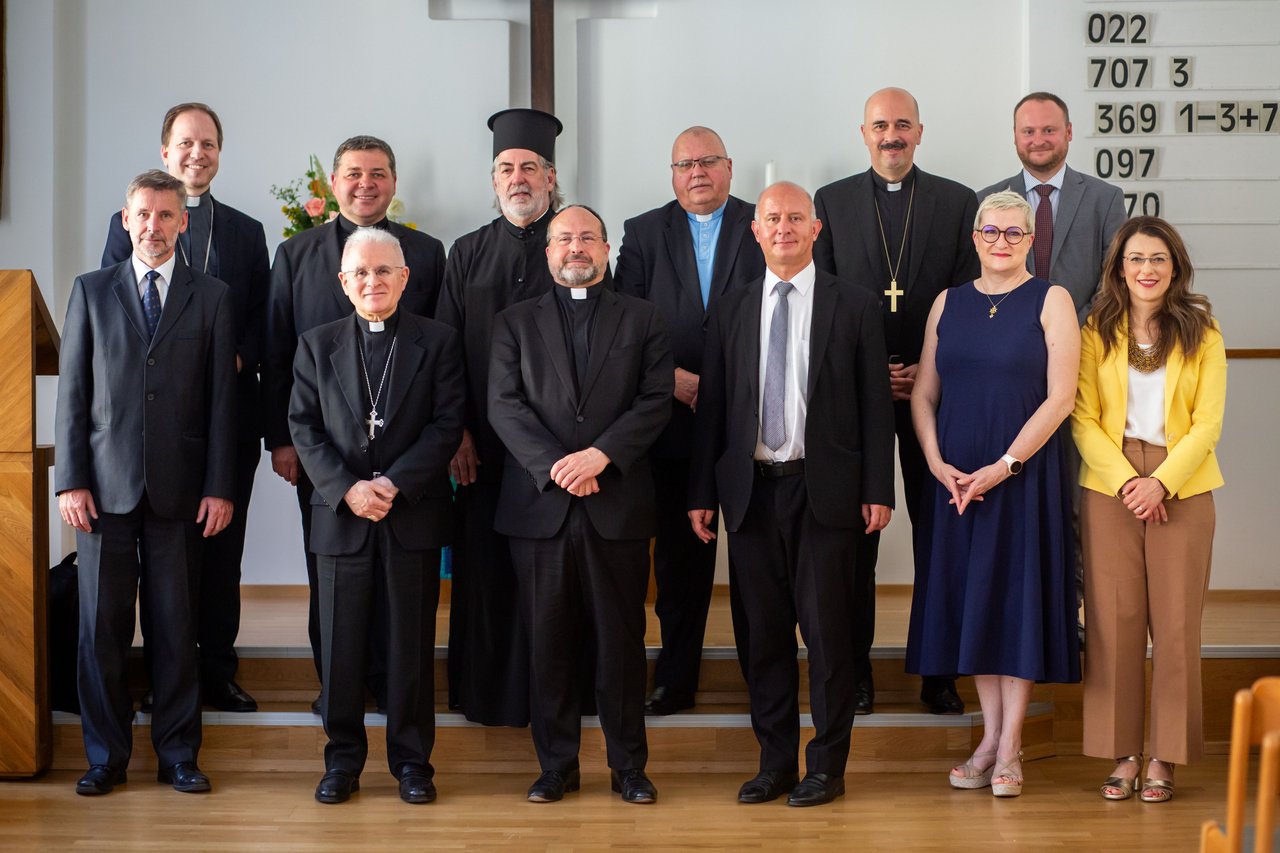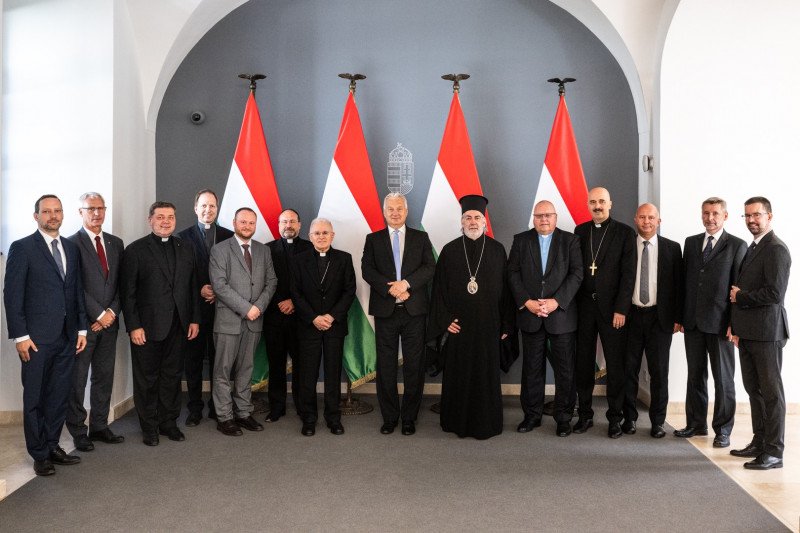A delegation of representatives from the Conference of European Churches (CEC) and the Commission of the Bishops’ Conferences in the European Union (COMECE) visited Budapest between June 22nd and June 25th to meet with Hungarian representatives and discuss joint priorities and the pressing challenges facing European society. As Hungary prepares to assume the rotational presidency of the EU, leaders of both CEC and COMECE expressed their expectations of and an optimistic outlook on future collaboration between leadership and the two organizations.

CEC-COMECE Delegation at the International Press Conference
“Hungary has the opportunity to influence the direction of the European Union,” said Nikitas, Greek Orthodox Archbishop of Thyateira and Great Britain, President of the Conference of European Churches (CEC), going on to say that this is why they seek collaboration with the Hungarian government at such a pivotal moment. The two organizations regularly contact the governments preparing for the rotating presidency, including the Hungarian government, which will take office from 1 July to 31 December.
In a press conference following a meeting with Deputy Prime Minister Zsolt Semjén and other government representatives, representatives from CEC and COMECE answered questions from the press and offered insight into their discussion. The press conference was held at the Evangelical Church of Buda Castle, where participants were welcomed by Vilmos Fischl, the Secretary General of the Ecumenical Council of Churches in Hungary (ECCH). Among the points discussed, the delegation most prominently underscored three subjects: maintaining a regular and open dialogue between the EU government and churches, peace and the situation in Ukraine, and a fair and equal EU enlargement process. Additionally, members of the delegation discussed the danger of rising political and social polarization across Europe with H.E. Mgr. Mariano Crociata, President of COMECE, calling on the incoming Hungarian EU Presidency to “promote social cohesion and address the issue of polarization.”

The delegation met with Hungarian Deputy Prime Minister Zsolt Semjén on Monday, 24 June 2024
Bishop Mariano Crociata, President of the Committee of Bishops' Conferences of the European Union (COMECE), emphasized that the main topic of the conversation was a continued acknowledgment and respect toward Christian values and heritage from the side of government. Essential in this discussion is the Hungarian government’s commitment to upholding Article 17 of the Treaty on the Function of the EU, which provides a legal basis for “open, transparent, and regular dialogue with churches.” Members of the delegation commended the commitment of the Hungarian government to respecting Article 17, with Manuel Barrios Prieto, Secretary General of COMECE, saying, “In Europe, churches are often marginalized, and it is good to see a government that listens to the churches.” Archbishop Nikitas added, “We would like not to be marginalized. Governments come and go, but churches remain.”
The leadership also discussed the situation in Ukraine and concerns regarding the peaceful resolution of the war. According to Bishop Mariano Crociato, although countries across Europe maintain varying perspectives on the conflict in Ukraine, it remains vital for parties involved to engage in a balanced dialogue on this issue, which may eventually lead to progress. Not only did CEC and COMECE representatives discuss peace in Ukraine, but they also expressed their concern for peace worldwide, particularly regarding the Holy Lands, stressing the importance of protecting religious and cultural heritage sites in these times of conflict. Regarding the third discussion point, the delegation advocated for a fair and equal EU enlargement process for all countries seeking entry.
In the latter half of the day, leaders of the member churches of the ECCH and the HCBC gathered for a meeting and roundtable discussion. In this meeting, representatives discussed the importance of ecumenism in current times and reviewed important topics from the day. Bishop József Steinbach, Ministerial President of the Reformed Church in Hungary and President of the ECCH, said that now is an essential time for ecumenism and truth and that the gospel of Jesus Christ must be proclaimed, saying that “where churches speak about the lack of Jesus Christ and the gospel, social justice will follow.”
"Churches in the EU are committed to dialogue, and they work jointly to ensure that respect for the values of human dignity, democracy, solidarity, freedom, equality, and the rule of law are at the forefront of EU actions and policies both in Europe and globally … In the period following soon after the elections to the European Parliament 2024 and at the start of the new legislative period, we invite Europe's leadership to work on reshaping the narratives based on the long-term trends that characterise the European integration process. The European Union has to be a space of shared solidarity, respect and a common vision that goes beyond the vision of prosperity and achieved economic aims (Lk 16: 19-31, Act 17:29). Christian values, shared by a majority of European citizens, can provide orientation and a guarantee of a safe approach to the changes we face, as well as contribute to overcoming societal gaps and strengthening the cohesion on the continent. Responses to new challenges have to go hand in hand with the remembrance of the positive vision on which the European Union was built, by honoring the common values of the Union, as well as by highlighting its achievements, especially in this period of commemoration of the 20th anniversary of the big EU enlargement."
Quote from the Joint Statement of CEC and COMECE on Churches’ concerns and perspectives around the Hungarian Presidency of the Council of the European Union